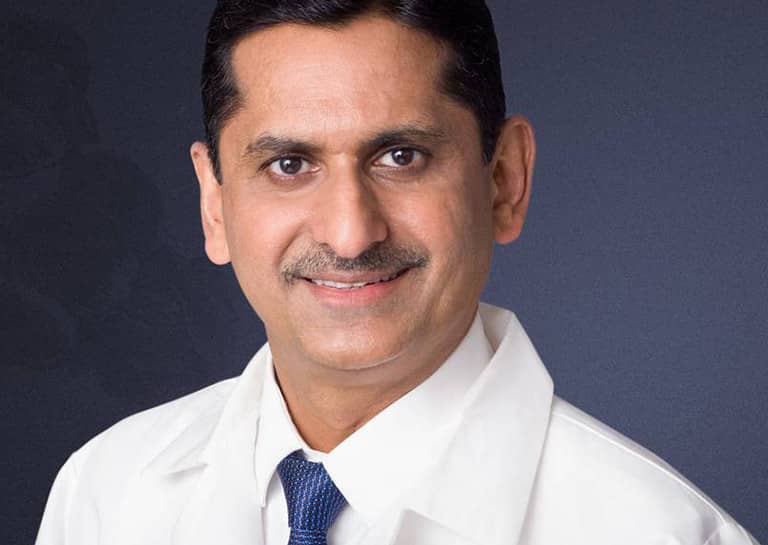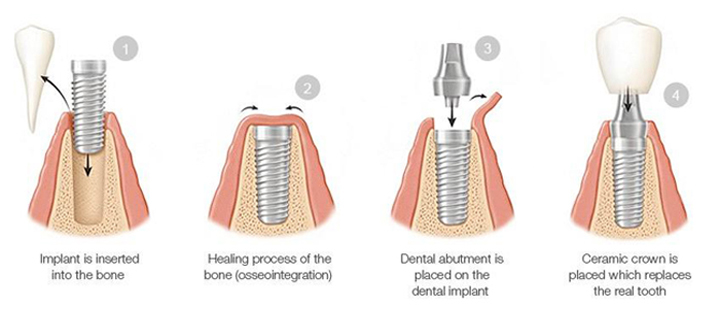Dental implants replace missing teeth. A single implant mimics the structure of a natural tooth, making it the most effective form of tooth replacement. Dr. Siny Thomas of Sugar Land has advanced training in implantology. You’ll receive natural-looking results that last.
What Are Dental Implants?
A dental implant is an artificial tooth with three components that make it look and function like a natural tooth.
- Fixture – An artificial root that is embedded below your gumline and fuses with your jawbone
- Abutment – A small connector that is screwed onto the implant to hold a dental crown
- Crown – A ceramic restoration to replace the portion of your tooth above the gumline
When Are Implants Used?
- Replace individual missing teeth
- Replace several teeth in a row with an implant bridge
- Support a complete arch of teeth with an implant overdenture
Read our implant overdentures page for details on how implants improve your experience with dentures.
What Are the Benefits?
Dental implants mimic natural tooth structure. Dr. Thomas will embed a fixture—or artificial root—below your gumline. In three or four months, the fixture and your jawbone will fuse. Implants have many benefits:
- Provide a solid anchor for crowns if individual teeth are missing
- Support a denture and prevent it from sliding, lifting, or falling out
- Stimulate jawbone and prevent shrinkage
- Keep bone intact to support your facial muscles and prevent facial collapse. For more information, read our facial collapse page.
- Look and feel like natural teeth
What’s the Process?
Implant placement
Successful dental implants require careful planning and placement. Dr. Thomas adheres to a reliable process:
- Review your medical and dental histories to ensure you’re a candidate for them
- Take 3-D x-ray images of your teeth, oral cavities, and sinuses to determine:
- If you have enough jawbone volume to support implants
- If bone grafting is needed
- Exact location for the implants
- Use 3-D navigation technology during placement to achieve exact position, angle, and depth for each fixture
- Follow post-surgery protocol for observation and maintenance
Read our All-on-4 dental implants page for details on a process that enables you to receive implants if your jawbone volume is low.
Lifelike restoration
Dr. Thomas has advanced training in cosmetic dentistry to provide restorations that look natural when you smile. After the healing process, Dr. Thomas will attach a dental crown to your implant. If you’re receiving a full arch of teeth, he will attach natural-looking dentures to multiple implants.
How Much Do Dental Implants Cost?
The cost is per implant fixture. Other factors will affect the final cost, but every case is different. During your consultation, Dr. Thomas will explain the treatment options for your situation and provide an estimate of the cost. Below are several items that affect the cost, but they likely won’t all apply to you.
- Tooth extraction
- Bone grafting
- Sedation services
- Surgery
- Abutment placement
- Dental crowns
- Dentures
Dr. Thomas is a Fellow of the International Congress of Oral Implantologists, which means that he has passed rigorous examinations on both the surgical and prosthetic phases of implantology. So he is qualified to complete the entire process—planning, surgical placement, and restoration—in his office. You’ll receive high-quality implants. One of the potential complications of having different dentists do the placement and the restoration of implants is the chance for communication errors. Since the surgeon isn’t intimately familiar with the prosthetic phase, there is a chance that the position of the implants may not be optimal. Before beginning your surgery, Dr. Thomas will know exactly where he wants the implants placed and why.
The Cost of Poor Quality
A dentist who takes shortcuts to save you money can make serious mistakes. Click here to read more about dental implant failure, which can be the consequence when proper procedures aren’t followed. The uncomfortable and costly results include:
- Improper healing
- Infection
- Loose fixtures
- Nerve damage
- Pain
Successful dental implants can last a lifetime. That saves you money in the long term.
How Do You Care for Dental Implants?
Individual implants
Treat them like your natural teeth.
- Floss daily.
- Brush twice daily.
- Avoid using them to bite hard objects.
- Keep your appointments for dental cleanings and exams.
Implant overdentures
Use a denture brush or extra-soft toothbrush and denture paste. Anything else could scratch your denture teeth.
Fixed (secured by screws)
- Brush your denture teeth daily.
- Use a water flosser to flush out debris beneath the base.
- Wear a custom night guard to protect your denture teeth from clenching or grinding.
- Keep your dental hygiene and exam appointments.
Removable (clips or snaps onto implants)
- Remove the denture nightly, brush it, and rinse it well.
- Soak it in denture solution.
- Gently, but thoroughly, brush your gums and the implant abutments to remove bacteria and prevent plaque buildup.
- Keep your dental hygiene and exam appointments.
If you’re interested in dental implants, call us or complete our Request an Appointment form.
“Dr. Thomas did an amazing job replacing one of my front teeth with a dental implant. He didn’t take any risks or shortcuts with any of my procedures. And he thoroughly answered my questions. I couldn’t be happier with the results.” – Shane S.



